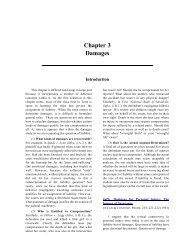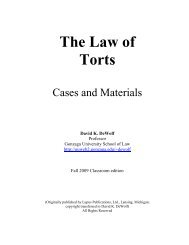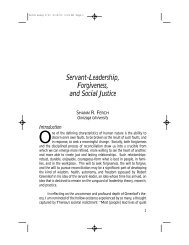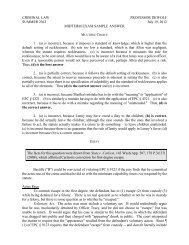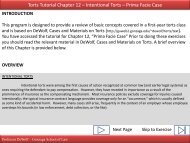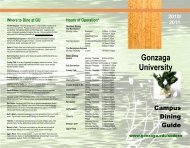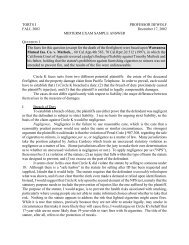The facts for Question 1 are taken from Erbrich Products Co., Inc. v ...
The facts for Question 1 are taken from Erbrich Products Co., Inc. v ...
The facts for Question 1 are taken from Erbrich Products Co., Inc. v ...
Create successful ePaper yourself
Turn your PDF publications into a flip-book with our unique Google optimized e-Paper software.
DeWolf, Torts I Sample Answer, Fall '94 Mid-Term Page 2argue that the πs "came to the nuisance": that because the industrial nature of the <strong>are</strong>a at thetime the activity first began, the πs couldn't have a reasonable expectation that they should befree <strong>from</strong> it. On the other hand, the πs may say that the change in the neighborhood was anatural evolution and that their expectation to be free <strong>from</strong> random releases of gas is a reasonableone. Tough call.2. Proximate Cause. <strong>The</strong> πs must show that the breach was a proximate cause ofdamage. In this case it would be easy to say that, but <strong>for</strong> the release of the gas (assuming that isfound to be a breach of duty), πs would not have been injured. Also, it is a legal cause of theinjury, since it occurred in a direct and unbroken sequence.3. <strong>Co</strong>mpensable Damage. Even if there was a breach of duty, it must proximatelycause a legally recognized <strong>for</strong>m of damages. Any of the plaintiffs who suffered property damagecan recover the lesser of (1) the cost to repair; or (2) the difference in fair market value be<strong>for</strong>eand after the injury. Any of the πs who suffered physical injury may recover the following:wage loss <strong>for</strong> any work that they missed, medical expenses, and pain and suffering, includingany fear and anxiety associated with the release. On the other hand, those who have not sufferedphysical injury, but claim emotional injury, such as grief caused by injury to a child or lovedone, or anxiety or fear of future injury—such claims would ordinarily not be compensable.However, if a π was a bystander to a severe injury, or if the emotional injury was especiallyconvincing, the court might permit a recovery even in the absence of physical injury.QUESTION 2<strong>The</strong> <strong>facts</strong> <strong>for</strong> <strong>Question</strong> 2 <strong>are</strong> <strong>taken</strong> <strong>from</strong> Fleege v. Cimpl, 305 N.W.2d 409 (S.D. 1981), inwhich the court decided that strict liability did not apply but the jury should have beeninstructed on res ipsa loquitur.I would recommend considering an action against Azure Resort and <strong>Co</strong>untry Club, andpossibly against the installer and/or seller of the motor/pump. To succeed, Nancy would need toshow a breach of duty, proximate cause and damages.1. Breach of Duty (Azure). One <strong>for</strong>m of breach of duty would be negligence. If Azurefailed to use the c<strong>are</strong> of a reasonably prudent person, they could be found negligent. <strong>The</strong>re issignificant evidence that the pump was installed in a negligent manner, with wires improperlyspliced. It may also be that in consulting with others who use pumps like this that there is acustom of the industry comp<strong>are</strong>d to which this installation was unsafe. If Azure either installedit itself, or had control over the manner in which it was installed, they could be considerednegligent. I would also consider a claim based upon res ipsa, since this might be an accident thatdoesn't ordinarily occur in the absence of negligence, where the instrumentality causing theinjury was under the exclusive control of the defendants, and other plausible explanations havebeen eliminated. However, there <strong>are</strong> issues about control in this case, and there is also somequestion as to what really caused the injury. Thus, the judge might not allow a res ipsainstruction on these <strong>facts</strong>.Strict Liability. <strong>The</strong> only claim that would not require proof of negligence is to arguethat Azure was engaged in an abnormally dangerous activity. Nancy would need to establish



